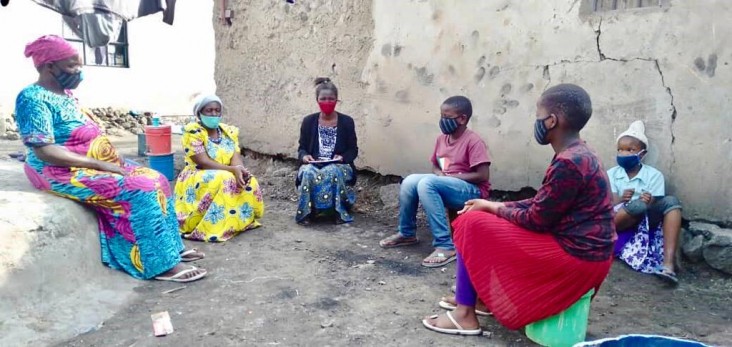Speeches Shim

Alifonsina, a 58-year-old grandmother, lives in Arusha City in northern Tanzania with her daughter and five grandchildren. Two grandchildren are in primary school, two are in secondary school, and one has completed Form Four. Alifonsina is living with HIV, and taking anti-retroviral medication. She is also the breadwinner of the household.
In 2017, Community Case Worker volunteer Angela Kweka enrolled Alifonsina’s family into the USAID Kizazi Kipya activity. Angela assesses the household’s needs and develops care plans with Alifonsina to better support her family and meet the health and education needs of her grandchildren.
Alifonsina is working to achieve a stable income to support her family, so Angela linked her to a community-based savings and lending group called Zekana Worth Yetu. Through her group membership, Alifonsina borrowed 160,000 Tshs (about US $70) to grow her business of selling soap and fish door-to-door.
In March 2020, the Arusha Region saw the first known COVID-19 case in Tanzania. As a result, widespread fear and stigma quickly spread through communities. Says Alifonsina, “My family and I used to have three good meals a day and get other basic needs because my business was doing pretty well. However, we were told to not socialize anymore, to have no contact with other people, to not make unnecessary movement, and to have no guests in our houses due to the COVID-19 pandemic. I lost all of my customers. No one would buy my fish and soaps because people feared COVID-19.”
As a result, Alifonsina saw an 86% decrease in her monthly income, and her family’s daily meals were reduced from three to one meal of porridge a day. Alfonsina and her grandchildren lost hope. She explains through tears, “My capital is gone but the family needs are constant (i.e. food and rent). I don’t know how I will put food on the table. I am really confused, and I have never been in this kind of situation before. I think my life is going back to where I started.”
In response to the COVID-19 pandemic, the USAID Kizazi Kipya activity has redirected program funds to train Community Case Worker volunteers like Angela on how to address mental health stress resulting from secondary impacts that COVID-19 has on communities. The project also prints and distributes government health education materials on COVID-19, including content specific to people living with HIV, and teaches volunteers how to make handmade masks.
Angela visits Alfonsina and her grandchildren on a weekly basis where she counsels and educates the family on how to prevent COVID-19. Despite the stress and upheaval, Alfonsina hasn’t missed her anti-retroviral medication doses. With the help of Kizazi Kipya’s counselling, Alfonsina is able to continue with her business. Even though her monthly income is still below pre-COVID-19 levels, she is keeping her family safe and looking forward to better days. The children are waiting for school to re-open so they can continue with their studies.

Comment
Make a general inquiry or suggest an improvement.